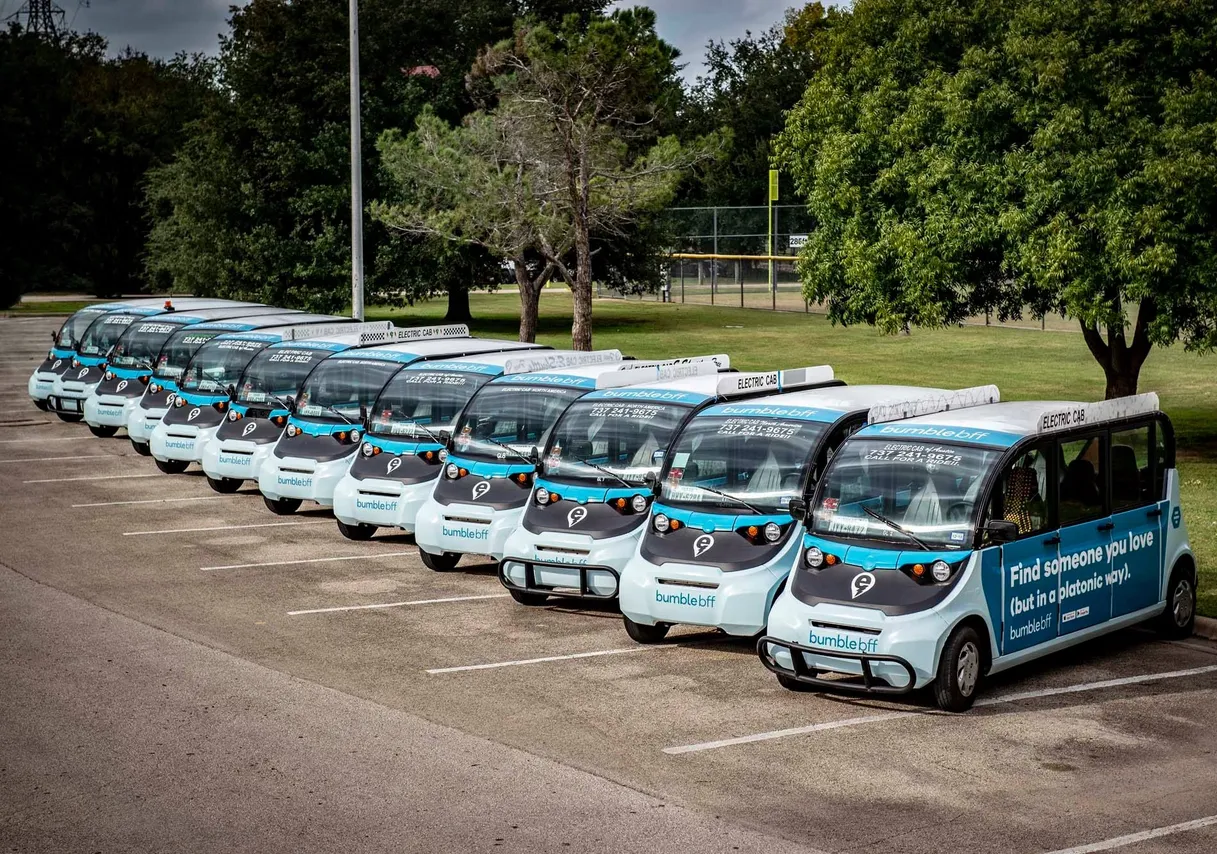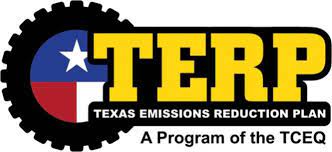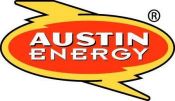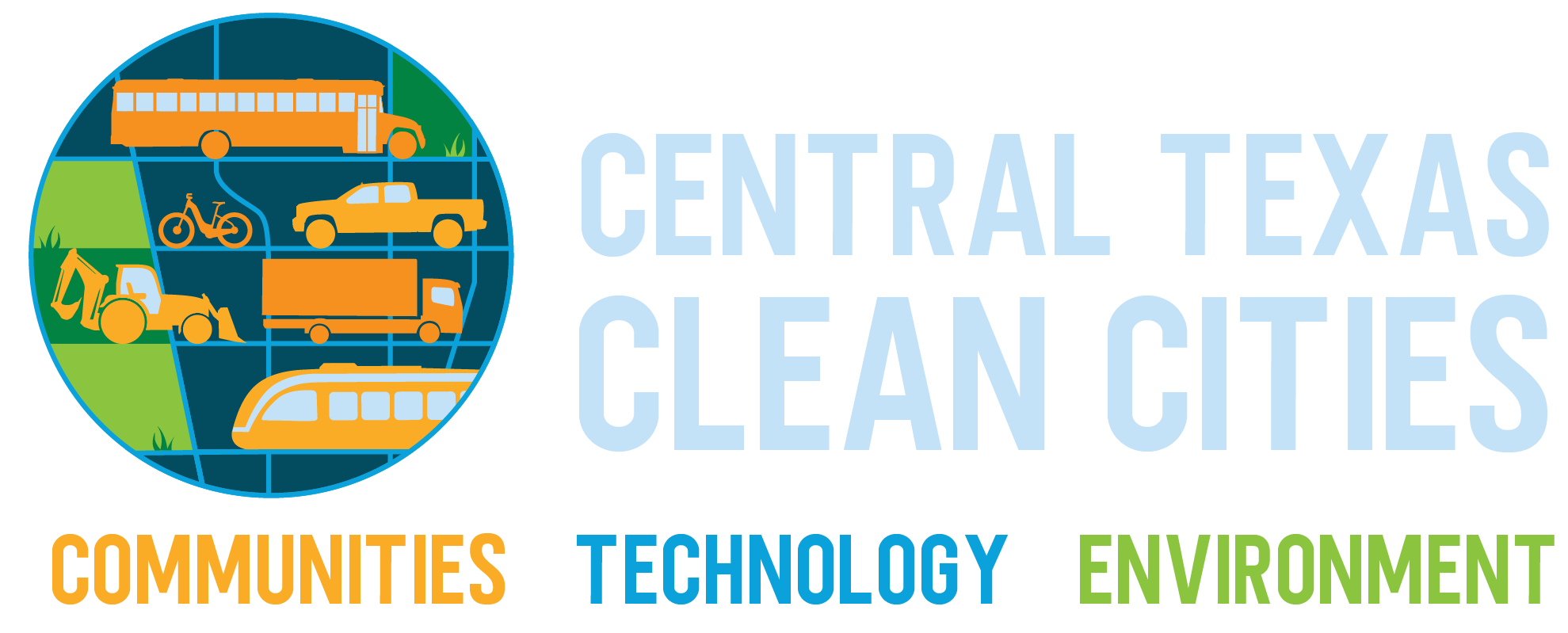
May 2023
LSCFA’s Department of Energy funded Rural Mobility project using Low Speed Electric Vehicles (LSEVs) as a mictrotransit platform in downtown Bastrop came to an end last year. It was a popular on-demand service helping visitors and residents alike access the downtown area’s grocery, food, medical services and fun activities. The area doesn’t have the demand to support a taxi or ride share service to provide service outside of the local transit’s hours. Fortunately, the City of Bastrop was able to fund the continuation of this free transportation – which is a big success as typically grant-funded projects aren’t continued after the grant ends.
Then, late last year, the City of San Marcos contracted for six eCabs to operate its “Get-around Downtown” shuttle service, this time not only moving residents and tourists, but students to and from Texas State University. The eCab story starts in Austin, Chris Nielsen, eCab CEO and founder, was working at a downtown Austin hotel years ago. He got his inspiration for his business by observing the lack of desire of existing ground transportation providers to give short fare trips coupled with seeing a golf cart with a license plate drive down the road. He quit his day job two days later. You’ll see this original business model in operation in Austin. The fleet of 33 eCabs are rented out and driven throughout downtown Austin. More information about the eCabs and the Rural Mobility Project is found on our Rural Mobility page and on eCab’s website.


A senior at Texas State University in San Marcos studying Public Relations, Taylor is participating in the Clean Cities University Workplace Development internship through Argonne National Lab. This program is designed to introduce interns to the Clean Cities program and it’s mission and broaden their knowledge of the the benefits of alternative fuels and energy efficient technologies.
Taylor is launching our new Fleet Recognition program which recognizes stakeholder organizations for their use of alternative fuels, fuel efficiency measures, and energy-efficient technologies which was collected through our annual stakeholder survey. Taylor observers, “I’ve learned a lot about the practical side of implementing these technologies and am impressed at how effective idle reduction and vehicle miles traveled reductions measures are in reducing the amount of fuel used and the amount of pollution generated.”
In a matter of weeks, Ford Motor, General Motors and Tesla appear to have shifted the tide on the electric vehicle-charging infrastructure in North America. Last month, Ford announced it had made a deal with Tesla that will allow Ford EVs to use Tesla’s charging stations with an adapter — and that starting in 2025, it will make Tesla’s charging tech standard on its own EVs. It was a surprising partnership between rivals, and on recently, General Motors said it struck a nearly identical deal with Tesla. Of interest to the biofuel and bioenergy industries, the newly signed law establishes new tax credits for sustainable aviation fuel (SAF), clean transportation fuels and clean hydrogen. It also extends several existing tax credits that benefit transportation biofuels, such as renewable diesel and biodiesel, and includes funding for biofuel infrastructure development.
Adopting new technology means changing our compliance standards. This has been true of every technological innovation, from fire to the printing press to the smartphone. Electric vehicles are no different. And where there’s change, there’s opportunity. So, here’s a not-so-bold prediction: OEMs, dealers, fleet management companies and other companies with EVs in their fleets will gain a competitive advantage by constantly scrutinizing compliance practices. Key focus areas include the following: -Battery protection and maintenance
-Charging infrastructure maintenance
-Safety regulations (proper labeling, installation, operation, storage, etc.)
-Manufacturer service requirements Training protocols
-Tax and reporting requirements (federal and state tax credits, emissions reporting, renewable energy obligations, fuel taxes, etc.)
The most successful businesses will ensure that they meet the requirements to qualify for incentives while using new knowledge to optimize performance in these areas. Read the full article here.

 | |
STATUS |
Emissions Reduction Incentive Grants Program (ERIG) |
CLOSED | |
Texas Natural Gas Vehicle Grants Program (TNGVGP) | CLOSED | |
Seaport & Rail Yard Areas Emissions Reduction Program(SPRY) | CLOSED | |
Texas Clean Fleet Program (TCFP) | CLOSED | |
Light-Duty Motor Vehicle Purchase or Lease Incentive Program (LDPLIP) | CLOSED | |
Rebate Grant Program (Rebate) | CLOSED | |
Texas Clean School Bus Program (TCSB) | CLOSED | |
| Alternative Fueling Facilities Program (AFFP) | CLOSED | |
New Technology Implementation Grant (NTIG) | CLOSED | |
Governmental Alternative Fuel Fleet Grant Program (GAFF) | CLOSED |
2023 EPA’s Clean School Bus Grant Program
The Environmental Protection Agency (EPA) has announced the 2023 Clean School Bus (CSB) Grant Program! This is the first grant funding opportunity through the multi-year Clean School Bus (CSB) program and follows the 2022 CSB Rebate Program, which was the first round of funding. Under the 2023 CSB Grant Program, EPA anticipates awarding approximately $400 million in competitive funding to eligible applicants for the purchase of zero-emission (ZE) school buses, clean school buses, and ZE charging infrastructure.
The EPA is prioritizing applications that will replace buses serving high-need local education agencies, rural areas, Tribal school districts funded by the Bureau of Indian Affairs and public school districts receiving basic support payments for students living on Tribal land, and rural areas.
Applicants must submit all grant application materials to Grants.gov by:
Tuesday, August 22, 2023, at 10:59 PM CT.
The EPA will host a series of public webinars regarding the CSB Grant Program from May through August to provide potential applicants with an overview and how to apply. Webinar registration links will be posted to the Clean School Bus Webinars webpage.
VW State Environmental Trust

The TCEQ has opened their first-come, first-served $87 million all-electric grant program, via the Texas Volkswagen Environmental Mitigation Program. Funding for the program will be allocated based on priority areas, and project categories. The program is designed for Class 8 Local Freight Trucks and Port Drayage Trucks, Class 4-8 School Bus, Shuttle Bus, or Transit Buses, Class 4-7 Local Freight Trucks, Airport Ground Support Equipment, and Forklifts and Port Cargo Handling Equipment.
Major notes about the program:
Additional details about the program, including grant totals by project area and details about application requirements and submissions, are posted here in this webinar
If you have any questions, or reach out directly to TCEQ staff Krista Edwards & Jack Frink, Grant Specialists, at VWSettle@tceq.Texas.gov and by calling (833) 215-TXVEMP (8989).
EVENTS

Renewable Natural Gas and Renewable Propane Lunch-and-Learn Webinar
Refuse hauler, tube trailer and various trucks fueling at a Freedom CNG station in Houston. Photo courtesy Freedom CNG.
The webinar will include discussion on:
Hear from:
August 23, 2023
12:00 to 12:45 CDT
Green Transportation Summit and Expo
Aug. 22–24, 2023
Tacoma, WA
The 12th annual Green Transportation Summit and Expo (GTSE) is comprised of three days of networking, information sessions, workshops, vehicle walk-throughs, and great accommodation provided with the 3-day pass. The 2023 show will also bring back the ride-and-drive event, giving everyone the chance to experience firsthand what clean transportation looks and feels like.

Austin Energy Hosts
The Austin Forum with UT’s Dr. Michael Webber
August 31, 5:00 pm
The worldwide energy sector is going through dramatic shifts in energy demand, end-uses, and sources. Population growth and economic growth are driving up total demand. Industrialization, urbanization, electrification and motorization are changing how we use energy. And a policy push for domestic, low-carbon and renewable fuels is changing our sources of energy. For this talk, Dr. Webber will give an entertaining and big-picture overview of global energy trends mixed in with humorous anecdotes, historical snippets, and unexpected examples that will give a surprising look into the future of energy. More
Subscribe to our newsletters for the latest updates, events, and insights.


A U.S. Department of Energy designated coalition in the Clean Cities and Communities partnership.